
Plastic dowels for secure mounting of all types
We offer the rightplastic anchor for installationsof all kinds. From powerful expansion anchors and intelligent universal anchors, to sustainable anchors made from renewable raw materials, the perfect anchor is available forevery application.
- We offer the right anchors for every material for a perfect, secure hold
- We also stock plastic anchors for special applications, e.g. damp rooms or plasterboard
- We sell any dowel in any quantity - From a single dowel
Universal dowel fischer DuoPower
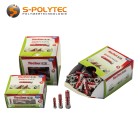 from €0.08 /
from €0.08 /Incl. 19% Tax
Universal dowel fischer DuoPower (long)
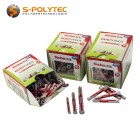 from €0.08 /
from €0.08 /Incl. 19% Tax
Universal dowel fischer DuoSeal (with screw)
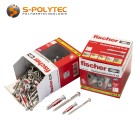 from €0.81 /
from €0.81 /Incl. 19% Tax
Expansion dowel fischer SX
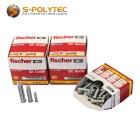 from €0.07 /
from €0.07 /Incl. 19% Tax
Universal dowel fischer UX (rimless)
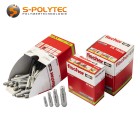 from €0.12 /
from €0.12 /Incl. 19% Tax
Universal dowel fischer UX Green R (with rim)
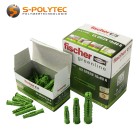 from €0.13 /
from €0.13 /Incl. 19% Tax
fischer FIXtainer SX Expansion dowel (210 pieces)
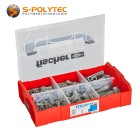 €19.90 / pcs
€19.90 / pcsIncl. 19% Tax
fischer FIXtainer UX Green R (210 pieces)
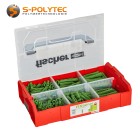 €27.99 / pcs
€27.99 / pcsIncl. 19% Tax
fischer FIXtainer SX-dowels with screws (210 pieces)
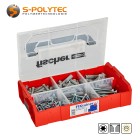 €24.99 / pcs
€24.99 / pcsIncl. 19% Tax
fischer FIXtainer DuoPower with screws (210 pieces)
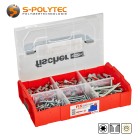 €24.99 / pcs
€24.99 / pcsIncl. 19% Tax
Anchors from fischer - Best quality for optimum hold
Huge selection ✓ No minimum quantities ✓ Already from 1 dowel ✓
For mounting our plastic panels and substructures, we offer a wide range of screws and matching drills. In order to fix the panels and profiles to the wall and ceiling, suitable dowels are usually required as mounting material. Regardless of whether façade cladding is to be screwed to the outside wall with our aluminium rails, or whether cabinets, shelves, signs or whiteboards made of our acrylic sheets are to be hung, we offer the right dowel for every application.
Depending on the load that the mounting object exerts on the fastening, we stock plastic dowels in a wide range of sizes from different diameters to different lengths. From simple 6mm expansion dowels, which are ideal for mounting our stainless steel spacers, to universal dowels that automatically adapt to the wall depending on the building material, to dowels with a sealing function, e.g. for mounting aluminium composite panels as shower partitions in the bathroom at home. The reasons for using dowels and screws as fixings are countless, and so the different types and sizes of dowels in our shop are also extremely versatile. Depending on the application, one specific dowel or even several dowels come into question. How to find the right anchor and which type of anchor is suitable for which building material, we have listed in the properties below. In addition, you will find recommended applications and screw sizes in the respective product description.
In contrast to other dealers, we do not use packaging units and also sell individual dowels.
In addition to the plastic plugs, which can be purchased in any quantity, we also offer complete assortments in various designs. The practical FIXtainer from fischer are forkable and can be connected to each other by a click system for easy transport. Depending on the assortment, the assortments include dowels in different sizes or dowels with matching screws, so that the necessary fixing material is always well sorted and ready to hand for the household or the craftsman.
Flexible with our freely configurable FIXtainers - fill according to your needs
Even though fischer's FIXtainer assortment boxes leave hardly any wish unfulfilled in terms of design and variety, we offer the possibility in our shop to configure your own assortment box entirely according to your personal needs. Our empty FIXtainers are available for this purpose. Simply select the desired dowels and screws in the desired sizes and quantities and place them together with the empty assortment box in the shopping cart to equip it as you like after delivery. The up to six compartments of the transport box can be separated by variable compartment division so that longer screws or drill bits can also be added. Of course, the empty FIXtainers are also available individually to store your stock of screws, dowels, bits, drills and everything else you need neatly and clearly.
Our dowels for fastening of all kinds at a glance
- Powerful expansion anchors with 4-fold expansion
- All-purpose nylon dowel for almost all building materials
- Universal 2-component anchors for highest load values
- Sealing dowels incl. screws for wet areas
- Sustainable all-purpose dowels made from renewable raw materials
- Practical assortment boxes with dowels and/or screws
- and much more
NOTE:All plastic dowels from our range are available in different diameters and, depending on availability, also in different lengths.
The right anchor determines load-bearing capacity
Which anchor is suitable for which application depends on a variety of different factors. On the one hand, the mounting substrate is of decisive importance. In addition, the forces acting on the fastening must be taken into account. The higher the load acting on a fastening point, the higher the load-bearing capacity of the individual screw-dowel combination should be. The way in which an assembly object is to be fastened also contributes to which anchor should be used.
For this reason, there are countless types of different anchors available on the market. From conventional plastic dowels with double expansion, to more load-bearing expansion dowels with quadruple expansion, to all-purpose dowels that expand or knot depending on the type of building material. In addition, there are always special anchors for special installations that have been specially developed for such applications in order to be able to guarantee the best possible hold of the fastening.
Notwithstanding the large number of different types of anchors, the range of anchors also varies in sizes, which are usually available in different diameters as well as in several lengths. The countless variations do not make it easy to keep track of which anchor is suitable for which application and which are only suitable to a limited extent or not at all. The choice of the right anchor is an important aspect that can determine the success or failure of an installation.
NOTE:When installing with dowels and screws, it is important that not only the dowel is selected to match the masonry, but also that the correct screw is used for the dowel. You will find suitable dowel screws in the corresponding category. For information on which screw sizes should be used for which anchor, please refer to the respective product description, either for the anchors, or vice versa for the anchor screws.
fischer DuoPower - The intelligent all-purpose plug
The fischer DuoPower is a 2-component plug that no household should be without. Due to its special design, the visually striking plug ensures reliable hold for almost all conceivable fixings. The anchor can be used with all building materials, even if the material of the wall or ceiling is unknown and cannot be determined because it is covered by plaster, tiles or wall cladding. Through the combination of spreading, folding and knotting, the intelligent anchor automatically adapts to the building material and thus ensures a perfect hold for the highest load values.
The DuoPower anchor is available from us in various diameters and lengths at attractive prices. In addition, we also offer the intelligent all-purpose anchor in practical assortment boxes, optionally with or without matching screws, so that the anchor that is needed at the moment is always at hand.
Properties of the fischer DuoPower 2-component plug
- The 2-component dowel is suitable for all building materials
- The DuoPower anchor adapts automatically to the building material
- The fischer DuoPower is characterised by the highest load values
- The perfect anchor for installations in unknown building materials
- The dowel combines hold through spreading, knots and flaps
- The universal dowel is also available in a long version
- Available in different diameters from 5mm-14mm
fischer SX - The expansion plug for concrete and solid stone
The fischer SX expansion plug with moulded edge is a powerful plastic plug made of nylon which, in contrast to simple expansion plugs with double expansion, ensures force transmission in all directions. Due to the 4-fold expansion, higher load-bearing capacities are possible in solid building materials such as concrete, solid sand-lime brick or even clinker. The SX plug can even be used for mounting wall lights, pictures and light wall cupboards or shelves in hollow sand-lime bricks or perforated building materials.
The moulded anchor edge ensures the ideal insertion depth of the anchor and also prevents the anchor from slipping too deeply into the drill hole. This ensures sufficient expansion of the expansion anchor when screwing in the anchor screw.
Properties of the fischer SX series expansion plug
- The SX expansion anchor has a fourfold expansion
- The 4-way spread guarantees optimum power transmission
- The moulded anchor edge ensures the ideal insertion depth
- The edge prevents the dowel from slipping through
- The expansion anchor is optimal for concrete and solid building materials
- Ideal for mounting lights, bathroom and WC fittings
- Available in different diameters from 4mm-16mm
- and much more
fischer UX - The all-rounder among anchors
With the all-purpose plug of the fischer UX series, all types of installation are possible. The inexpensive alternative to the fischer DuoPower is suitable for all building materials and combines the functions of spreading or knotting, depending on the nature of the installation substrate. In solid walls made of concrete or solid brick, the plastic plug expands and thus offers maximum load-bearing capacity thanks to reliable expansion. In hollow building materials and slab building materials, the best possible hold is achieved by knotting the anchor.
Thanks to its moulded anchor edge, the high-quality universal anchor is perfectly suited for push-in installation and prevents the anchor from being inserted too deeply into the drill hole or from slipping through when the screw is screwed into the drill hole. The rimless version, on the other hand, is ideal for push-in installations without the rim protrusion preventing flush installation with countersunk screws. The angled connecting webs on the anchor shaft serve as an anti-rotation device, so that the anchor ensures a firm fit in all building materials and prevents it from turning with the screw.
Properties for all-purpose plugs of the fischer UX series
- Universal plastic dowel made of high-quality nylon
- Straddled or knotted depending on the building material of the substrate
- Optimum hold even in perforated bricks or plasterboards
- Suitable for push-in mounts as well as push-through mounts
- Inclined connecting webs serve as anti-twist protection
- A moulded-on dowel edge prevents the dowel from slipping through
- Also available in a long version for greater anchorage depths
- Available in different diameters from 5mm-14mm
fischer DuoSeal - dowelling and sealing in one step
With the fischer DuoSeal plug, we offer the perfect plastic plug for pre-insertion installations on tiles in damp rooms and wet areas. The drill hole is perfectly sealed by the soft plastic edge. Additional grooves on the plug shank compensate for unevenness in the drill hole, ensuring a secure seal of the drill hole without the use of additional sealants.
The two-component universal plug is suitable for all building materials and automatically adapts to the building material to always achieve a perfect hold. In addition to closing the drill hole, the anchor edge also prevents the plastic anchor from sliding too deeply into the drill hole and ensures the ideal insertion depth into the drill hole so that the screw supplied can perfectly develop the functionality of the anchor according to the substrate.
Product characteristics for DuoSeal plugs by fischer
- fischer DuoSeal plugs are always supplied with a matching screw
- The supplied screw with Torx drive is made of stainless steel
- Sealing effect of the borehole without the need for sealants
- The soft edge of the universal plug closes the drill hole perfectly
- Permitted for applications in commercial or public wet areas
- Ideal for installations in bathrooms, kitchens, swimming pools, saunas or wellness areas
- Gentle installation on tiled subfloors with little effort
- The 2-component anchor provides reliable hold in all building materials
- The fischer DuoSeal combines hold by spreading, knotting and flaps
NOTE:The fischer DuoSeal is only suitable for fixings on tiled surfaces and should only be combined with the screw supplied to ensure the sealing effect.
fischer Green - Dowels with sustainability
Plastic anchors are, as the name suggests, made of plastic. Depending on the type of plug and the manufacturer, polyamide, which is more familiar to most people under the brand name nylon, or polypropylene is usually used for production. The company fischerwerke GmbH & Co. KG, however, is taking an important step in the spirit of sustainability and is producing plastic plugs in its Green Series that consist of at least 50% renewable raw materials. The properties of the anchors, which are available in various designs, are not affected, so that the load capacities are comparable with conventional anchors of the same type.
In our online shop we offer the green plastic plug in the UX Green version. This all-purpose plug with reliable expansion has the same properties as our conventional nylon plugs of the fischer UX series and is available from us in various diameters in any quantity, or as a range consisting of the most common sizes in the household in the popular fischer FIXtainer transport box.
Properties for anchors in the fischer Green series
- fischer Green anchors are made from at least 50% renewable raw materials
- The load-bearing capacity of the more environmentally friendly anchors remains unchanged high
- fischer Green dowels are hardly more expensive despite their more complex manufacture
- fischer UX-Green is the sustainable version of our all-purpose anchors
- The sustainable anchors are also available as expansion anchors (SX)
- fischer also offers the grass-green plugs especially for aerated concrete
Which dowel is the right one?
To determine which anchor provides the best possible hold for the application depends on three main factors.
The anchor must match the building material
The first and sometimes most important factor is the nature of the substrate in which the anchor is to be inserted. Depending on whether it is solid concrete, solid sand-lime brick, hollow brick or aerated concrete or plasterboard, the right anchor must be selected to match the building material, because the functionality of an anchor is different for each building material. However, there are also all-purpose anchors that combine two or more functions of different anchors. With the DuoPower plug from fischer, you are always on the right side, even with unknown building materials, so that a sufficiently high load capacity can be guaranteed for almost all applications.
The right dowel diameter
Once the appropriate anchor type has been determined, the diameter of the anchor is another important factor. To put it simply, the thicker the anchor diameter, the thicker the screw that can be used. A screw with a larger diameter has a higher load capacity and usually also a larger screw head, so that attachments can be mounted here that have a higher weight. The screw should always be selected in such a way that the diameter is not too small, because otherwise the anchor may not be able to develop its functionality sufficiently. If the diameter of the screw is too large, this can result in break-outs of the drill hole or damage the anchor, so that here too there is no longer sufficient load capacity.
Rule of thumb for dowel diameter
Ø Dowel (in mm) = Ø Screw (in mm) + (Ø Screw (in mm) * 0,3)
For a dowel screw of size 6x55mm, this formula would look like this.
Ø Dowel (in mm) = 6mm + (6mm * 0,3) -> 6mm + 1,8mm -> 7,8mm
A dowel with a diameter of 7.8mm is likely to be difficult to obtain, so here we round up to 8mm, so that in the above example of the dowel screw in 6x55mm, a dowel of size 8x40 is the perfect choice. It should be noted, however, that this formula is only a guide for standard fixings with expansion anchors or general purpose anchors. Other guide values apply for gas concrete anchors, plasterboard anchors or special anchors for threaded rods. In the article descriptions of our anchors we have listed recommended combinations of anchor size and screw sizes.
The right dowel length
The length of an anchor depends on which loads act on the anchor. These are differentiated into tensile force, i.e. which acts in the opposite direction to the anchor, the transverse force, i.e. which load acts at right angles to the anchor and the oblique force, a combination of both loads, which acts depending on the attachment part. The possible load can certainly be increased by using a longer anchor, resulting in a higher anchorage depth. However, this only applies if a longer screw is also used. It is also important to consider whether the anchor is inserted directly into the wall. This type is also known as pre-insertion installation, in which the dowel is inserted before the attachment part. Another possibility is to insert the anchor through the mounting object into the drill hole. This variant is called push-through installation. In this case, however, the length of the dowel must be increased by the depth of the attachment.
Rule of thumb for dowel lengths
Variant 1:Dowel length for push-in installation
Dowel length (in mm) = (Screw length (in mm) – Attachment thickness (in mm)) - (Ø Screw (in mm) * 3)
When mounting a 3mm thick aluminium composite panel with a 6x55mm dowel screw, this formula would look like this.
Dowel length (in mm) = (55mm - 3mm) - (6mm * 3) -> 52mm - 18mm -> 34mm
In the example of the pre-set installation, the dowel in the size 8x40mm should be used, because this is ideal in diameter and length to ensure maximum loads. If, on the other hand, an add-on part with a higher material thickness is used, for example a wooden cladding made of 20 mm thick solid wood boards, the screw length would have to be selected longer, because with a screw of 55 mm length only 25 mm of the screw thread would penetrate into the anchor, which is too small for a secure installation. We have summarised detailed information on the selection of the correct screw size for you in the category dowel screws.
Variant 2:Dowel length for push-through installation
Dowel length (in mm) = (Screw length (in mm) – Attachment thickness (in mm)) - (Ø Screw (in mm) * 3) + Attachment thickness (in mm)
When through-fitting a plastic panel 10mm thick, the calculation of the dowel length must be adjusted a little and would look as follows.
Dowel length (in mm) = (65mm - 10mm) - (6mm * 3) + 10mm -> 55mm - 18mm + 10mm -> 44mm
Usually, the necessary screw size is determined in advance, based on the assembly object, because this provides information about the necessary length, depending on the thickness of the attachment part and the diameter of the screw, which in turn depends on the total weight of the attachment part. In our example of through-hole mounting, the screw must be selected longer, because 10mm of the thread length is lost to the thickness of the attachment part. Of course, these 10mm must also be taken into account when choosing the right anchor, because both the anchor and the screws must be screwed far enough into the mounting substrate to achieve a sufficient hold in the substrate. This results in a theoretical screw length of 6x65mm, as well as a dowel with a minimum size of 8x50mm.
NOTE:The minimum length of an anchor should never be undercut, as this has a negative effect on the load-bearing capacity. Longer anchors, on the other hand, can be used without hesitation, but the length of the screws should then also be greater. The advantage of a greater anchoring depth of the dowel in the mounting substrate is a higher load capacity in terms of tensile and shear force.
How to remove dowels from the wall?
A plastic dowel can be easily removed if necessary. To do this, the screw should be completely unscrewed from the anchor beforehand, because otherwise the expansion or knotting will still affect the anchor, which will, however, be released again when the screw is unscrewed. Afterwards, the anchor can usually be pulled out of the drill hole with needle-nose pliers. This often requires a certain amount of force. If pulling out with pliers does not work, a little trick can be used. To do this, turn the screw that has just been removed a little bit into the dowel and use the needle-nose pliers as a lever by enclosing the screw with the pliers and pulling the screw and dowel out against the wall by means of leverage. Care should be taken not to damage the wall or ceiling with the pliers. A cloth to protect the surface can prevent damage.
Plastic dowels that are screwed into plasterboard or aerated concrete can be easily removed again with the auxiliary tool used to screw them into the substrate by changing the direction of rotation counterclockwise. Anchors that are chemically inserted into the substrate, on the other hand, can only be removed with difficulty, for example by drilling them out.
Recycling of plastic dowels
Dowels are made of different plastics depending on the manufacturer. As a rule, polyamide (nylon) or polypropylene is used for the production of plastic dowels, which are basically very suitable for recycling. However, plastic dowels are usually only disposed of after use, so that they usually contain coarse impurities due to adhering plaster residues or drill dust, which makes it difficult to separate them according to plastics using automated processes in recycling companies. Very few dowels that are disposed of via the recycling bin or the yellow bag can actually be cleanly separated and thus processed into new prefabricated plastic parts or recycling boards by regranulation. Even though most plastic dowels are thermally recycled, i.e. they generate heat by burning in incineration plants, disposing of them in the plastic waste makes perfect sense, because every dowel, no matter how small, that can be recycled saves valuable raw materials.
Before disposal, the screws should be removed from the dowels and, if possible, coarse impurities should be detached to facilitate recycling.